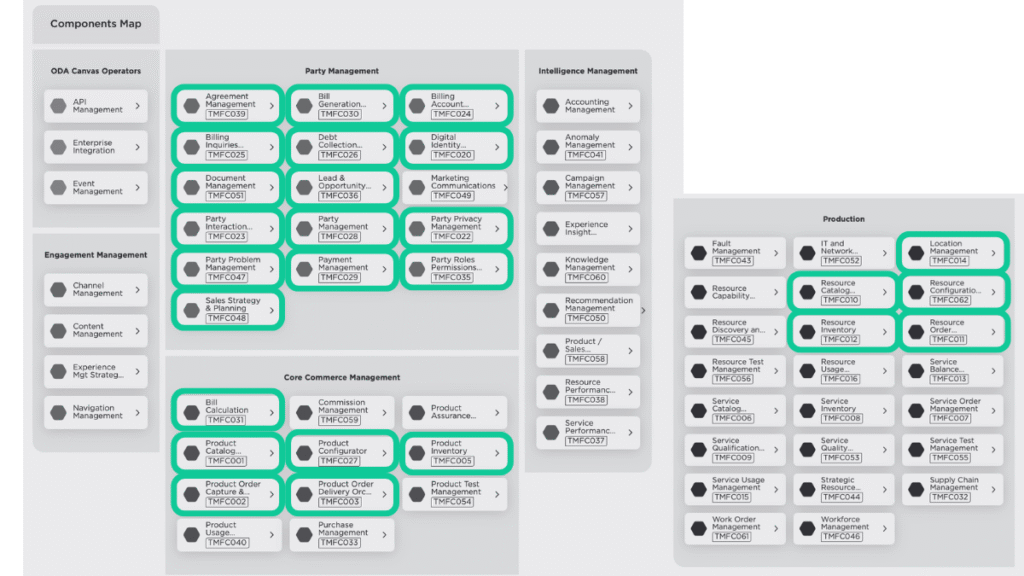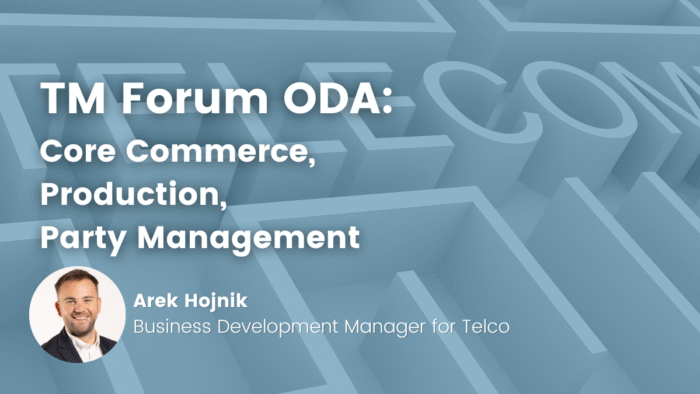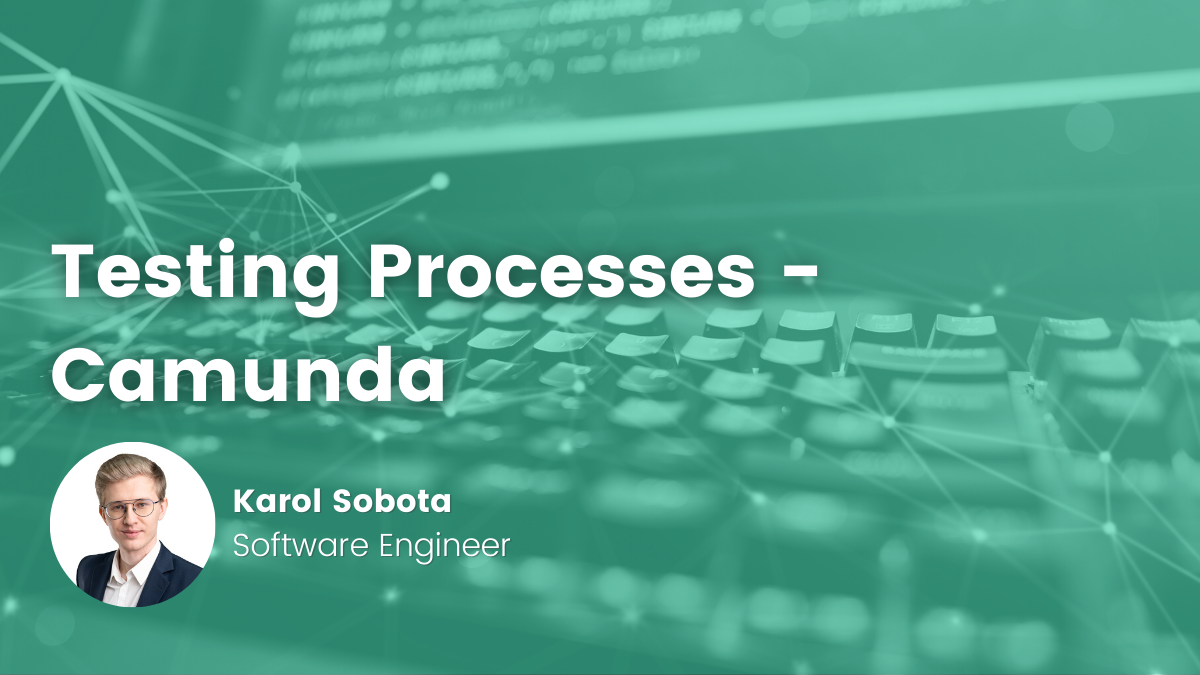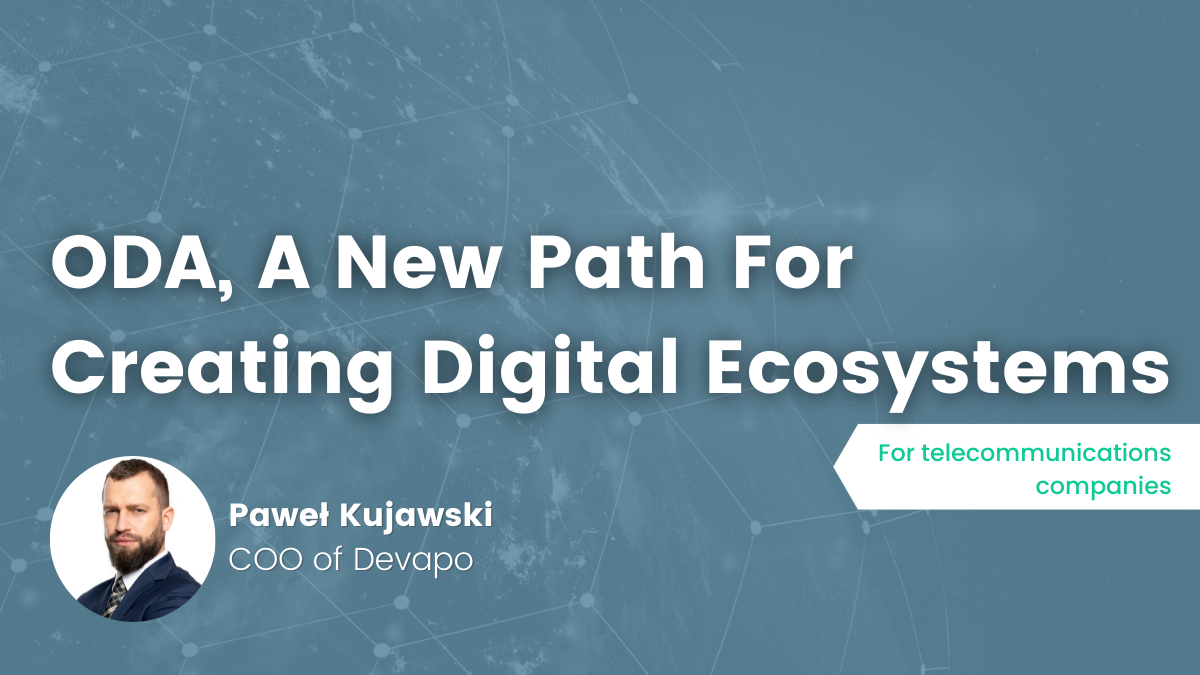- Arek Hojnik
- Read in 3 min.
The TM Forum Open Digital Architecture (ODA) is a reference framework that defines how modern telecom operators can build modular, agile IT ecosystems. It’s made up of several domains. Here at Devapo, we help telcos transform across three of the most critical: Core Commerce, Production and Party Management.
Below, we break down the key components of each ODA domain we implement in client projects – and, more importantly, explain why these specific areas make a real difference.

Core Commerce – the digital heart of products and orders
Core Commerce is at the centre of a telecom operator’s digital business. It manages products, offers, customer orders and billing – all in an integrated, scalable way.
- Product Catalogue Management (TMF C001) – the heart of it all. Defines, configures and bundles products into sellable offers.
- Product Order Capture and Validation (TMF C002)– captures customer orders and checks their eligibility (e.g., technical feasibility).
- Product Order Delivery Orchestration & Management (TMF C003) – coordinates how orders are fulfilled across systems (e.g., service activation).
- Product Configurator (TMF C027)– enables dynamic product set-ups based on business rules.
- Product Inventory (TMF C005)– tracks what each customer has, and in what configuration.
- Bill Calculation (TMF C031)– calculates charges: recurring, one-off, discounts – all based on catalogue logic.
Why does it matter?
Without a central catalogue and orchestrated order management, there’s no agility, no personalisation, and no real digital scalability. Core Commerce enables fast time-to-market and modern customer experience.
Production – turning products into real services
Production covers the technical side – the resources and infrastructure needed to deliver what the customer ordered.
- Resource Catalogue (TMF C010) – defines the network and infrastructure components (e.g., routers, IPs, ports).
- Resource Order Management (TMF C011) – reserves and assigns technical resources.
- Resource Configuration and Activation (TMF C062) – executes changes in the network (e.g., opens a port, activates service).
- Resource Inventory (TMF C012) – keeps a real-time view of infrastructure state and usage.
- Location Management (TMF C014) – manages data about customer locations and serviceability.
Why does it matter?
No matter how good the product, if it can’t be physically delivered, it’s worthless. Production ensures that services are activated and run properly, matching what was ordered.
Party Management – managing the full customer lifecycle
Party Management is about everything related to the customer: identity, documents, billing, consent, relationships and payments.
- Digital Identity Management (TMF C020) – handles login, registration, authentication and secure access.
- Party Interaction Management (TMF C023) – tracks all interactions with customers (calls, chats, emails).
- Document Management (TMF C051) – stores customer-related documents like contracts or consents.
- Agreement Management (TMF C039) – manages contract lifecycles.
- Bill Enquiries Management (TMF C025) – handles queries and disputes about invoices.
- Party Management (TMF C028) – central source for customer records, roles and relationships.
- Sales Strategy and Planning (TMF C048) – supports strategic sales planning and segmentation.
- Lead & Opportunity Management (TMF C036) – manages the process of converting leads into customers.
- Party Privacy Management (TMF C022) – manages consents and privacy preferences (e.g., for GDPR).
- Bill Account Management (TMF C024) – oversees financial accounts tied to customers.
- Bill Generation Management (TMF C030) – produces recurring and one-off bills.
- Debt Collection Management (TMF C026) – manages overdue payments and collections process.
- Payment Management (TMF C029) – tracks, processes and applies payments.
- Party Problem Management (TMFC047) – identifies, logs, and resolves customer-related issues efficiently, supporting consistent service.
- Party Roles & Permissions Management (TMFC035) – manages role-based access and permissions across customer and internal user profiles.
Why does it matter?
Customers expect clarity, compliance, and quick service. Party Management brings together all the data and processes needed to meet those expectations – securely and efficiently.
Three pillars, one vision for digital transformation
TM Forum ODA is not just about software architecture – it’s about building future-proof, composable systems that can evolve fast. The division into Core Commerce, Production, and Party Management helps create modular, modern and integrated ecosystems.
At Devapo we are partner of TM Forum since 2019, we help telecoms design and implement these key areas – because true digital transformation starts with understanding what each part is for.
Leverage Digital Transformation
Switch to high-performance technology for seamless grow







